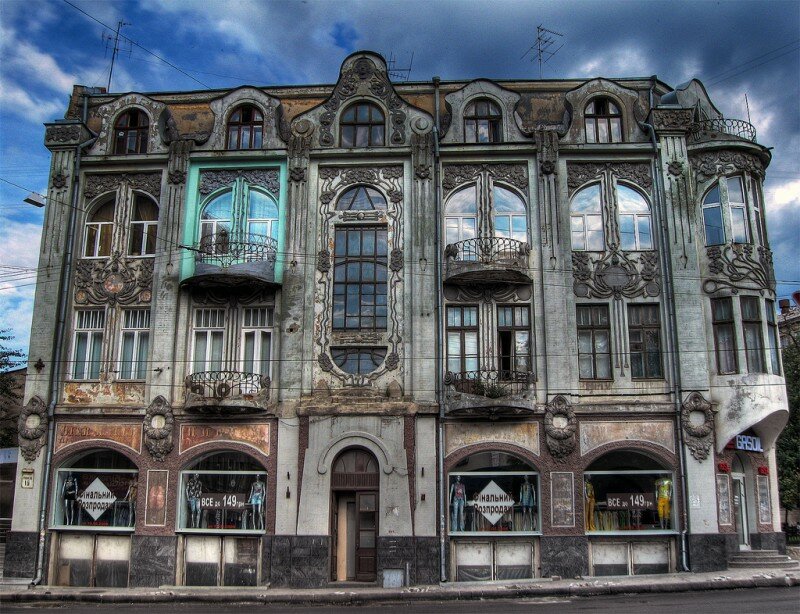As the month of May approaches, so does Ukraine’s deadline for proving to the European Union it will be ready to sign the Association Agreement in November. The signing of the agreement has been made contingent upon Ukraine’s progress towards reforms in three areas, as demanded by the EU: prevention of selective justice, elections according to international standards, and other reforms as defined in a jointly agreed Association Agenda. Eastbook.eu spoke with Ambassador Extraordinary and Plenipotentiary of Ukraine to the Republic of Estonia H.E. Mr. Viktor Kryzhanivskyi, to get a more in depth look at how Ukraine is viewing these issues, and what to expect by November…

Starry, Starry Night, Ukraine, author: Matt. Create., source: Flickr
1. Have Ukraine’s objectives concerning European Integration changed since the 2010 presidential elections? How so?
Ukraine has chosen European integration as the priority of its foreign policy since restoration of independence in 1991. This objective has not changed. Moreover, it has gained a new impetus after the Presidential elections in 2010. It remained a cornerstone of the “priorities of the foreign policy of Ukraine” which were adopted soon after the aforementioned elections. The Parliament of Ukraine has adopted in 2012 a strong Declaration in the same spirit, and in March 2013 the President of Ukraine Mr. Viktor Yanukovych has issued a special Decree on the soonest adaptation of all socio-economic and legal instruments of Ukraine to the standards of the European Union. Recently, the President, the Prime-Minister and the Speaker of the Parliament of Ukraine have made strong statements on the forthcoming signing of the Association Agreement with the European Union and the Agreement on the establishment of the free trade zone with the EU, which is planned for the November 2013 Summit on Eastern Partnership to be held in Vilnius. As you can see, the future full fledged membership in the European Union as the primary objective of Ukraine is now being implemented in a number of very practical steps.
2. In the immediate years after the Orange Revolution, Ukraine’s behaviour towards the European Union was constructivist and spoke of ‘Ukraine’s place in Europe’ and ‘Ukraine’s European choice’ with a strong attention to European Union membership. In the final years of the Yushchenko government, after little progress was made with European integration, Ukraine government’s behaviour became more rationalist and spoke more of small steps such as visa facilitation and free trade, and spoke less of Ukrainian EU membership or Ukraine’s European identity. Do you think the final years of the Yushchenko presidency, in concerns to European Integration, have any similarities to the current government’s behaviour?
I can agree that during the Yuschenko presidency a little progress was made in the sphere of the euro integration of Ukraine and a lot of time was spent in vain. Unfortunately, after the so called Orange Revolution, many pro-European slogans as well as expectations of Ukrainian people in this regard remained unfulfilled. Today we witness not just a strong will of the leadership of my country to reform Ukraine on the basis of all-European values but very pragmatic and practical efforts in this direction.
3. Does the idea of ‘Ukraine having a European identity’ play any part in relations between the EU and Ukraine or are relations more pragmatic?
I think – both: of course we are Europeans and not just because of the geographical location of Ukraine. We are Europeans due to the centuries old European mentality and strong historical ties to other European nations. (The daughter of the Prince Yaroslav Mudryi – Yaroslav the Wise – Anna was the queen of France and the daughter of the Great Prince of Kyiv Mstyslav I Garald was the queen of Sweden and then of Denmark. She is known to historians under the name of Malfryda). So, we can say that the idea of European identity plays an important role in our aspirations to become a member of such a pan-European Organization as the European Union. On the other hand, we are pragmatic, since the only way to create a modern State and a civil society is to follow civilized rules and values like market economy, democracy and the Rule of Law. These principles are the cornerstone of the European Union.
4. Have the ‘working relations’ with the European Union changed since the 2010 presidential elections?
Yes, “working relations” between Ukraine and the EU have changed significantly after the Presidential elections in 2010. These relations became more intense and result oriented. Last year we have managed to finish a very hard job of elaborating Association Agreement and Agreement on the creation of a free trade zone with the EU. We are close to the considerable liberalization of the
visa regime. We are now implementing a significant number of the bilateral EU-Ukraine projects related to our internal reforms in the sphere of economy and democratic development which were initiated after the Presidential elections in Ukraine. And, as I mentioned earlier, we expect that in November this year Ukraine will sign the Association Agreement with the European Union.
5. Do you see the European Commission’s attitude towards Ukraine’s European Integration as ‘take it or leave it’ in concerns to the requirements they have put forward in the 2013 EU-Ukraine summit? They require for Ukraine to meet requirements concerning “selective justice, elections and Association Agenda reforms” by May.
Do you think the European Union is going to allow any room for compromise?
Ukraine has very constructive relations with the European Commission on all points of the EU-Ukraine agenda. The number one in such an interaction is the goal of achieving the signing in Vilnius during the EU Summit on Eastern Partnership in November this year of the Association Agreement which includes also the creation of a free trade zone. Such an objective requires a number of steps to be taken by both sides – Ukraine and EU. For European Commission it is important to convince all member States to sign the above mentioned Agreement, for Ukraine it is necessary to fulfill certain obligations related to the internal reforms in socio-economic and democratic sphere with a view of bringing them as close as possible to the EU standards. So, both sides have obligations. At the same time EU understands that some requirements of the internal reforms in Ukraine need more time than the others. That is why both sides are using also terms like “considerable progress” in achieving certain criteria which means that there are no requirements which can block the signing of the Association Agreement if there is a strong political will on behalf of the European Union.

Salubrious *Kharkov, Ukraine), author: Nick_N, source: Flickr
6. Do you think the European Commission and the member state’s have different preferences concerning Ukraine’s Integration? Compare the European Commission’s stance with Estonia’s official stance.
I can be absolutely sure only in regard to the position of the Republic of Estonia which is very positive in terms of the integration of Ukraine to the European Union. As for the other member states of the EU, according to my information there is an emerging consensus which by November this year can be finalized. The European Commission is considering the position of all member states and will take a final decision accordingly. At this stage the Commission is very helpful and demonstrates very promising attitude in terms of the results of Vilnius Summit.
7. Does Ukraine really see Russia’s ‘customs union’ as a realistic alternative to the EU’s association agreement?
No, we do not see the Custom Union as an alternative to the EU. We have already made a decision on Euro integration including on the legislative level and there is no way how Ukraine can choose something else. At the same time, considering strong economic ties with the Russian Federation, Belarus and Kazakhstan, Ukraine is working on finding the best possible format of our interaction with the CU
8. Ukraine seems to following a multi-vector foreign policy concern EU and Russia. What do you see as a realistic outcome? Ukraine finding a comfortable position in between EU and Russia gaining benefits from both sides? Or ultimately will Ukraine have to make a decision as to what direction takes full priority?
I have covered this question in my previous answer. Besides, the only politicians and so called analysts who speak about the absence of the decision on behalf of the leadership of Ukraine with regard to our foreign policy priorities are those who come from the countries of the Custom Union and their allies in the EU.
[blackbirdpie url=”https://twitter.com/UWCongress/status/318915443744194564″]
Interview courtesy of Ambassador Extraordinary and Plenipotentiary of Ukraine to the Republic of Estonia Viktor Kryzhanivskyi.
Interview questions composed by Adrienne Warren in collaboration with Mark Underwood (MA) of Tartu University, department of European Union and Russian Studies.

